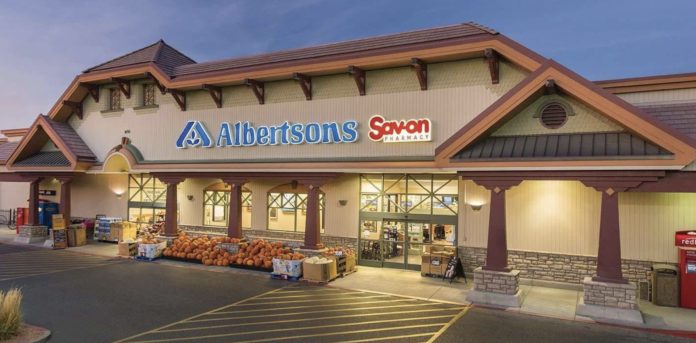
Nation’s largest supermarket chain purchases iconic Idaho grocery brand
By Eric Valentine
 The purchase of an iconic Idaho brand by one of the nation’s largest grocery providers is going to feed everyone fresher and cheaper food, while raising employee wages and benefits. It also figures to reduce in-store promotions while weakening unions and increasing the value of stock for large-scale investment groups who own them.
The purchase of an iconic Idaho brand by one of the nation’s largest grocery providers is going to feed everyone fresher and cheaper food, while raising employee wages and benefits. It also figures to reduce in-store promotions while weakening unions and increasing the value of stock for large-scale investment groups who own them.
Depending on whom you ask, one of those first two sentences will be truer than the other by early 2024. That’s when the federal government will decide if the merger agreement between Kroger and Albertsons, reached last week, can move forward to create a 5,000-store chain in over 48 states, making it second in size only to Walmart. Any change, then, to the Albertsons-Atkinsons’-Natural Grocers et al. landscape in the Valley is unlikely until 2024, too.
“No real concerns,” said Mike McKenna, executive director of the local chamber of commerce. “Only a hope that food costs may go down with a larger chain coming on.”
Another voice with an understanding of commercial trends is Idaho-based The Krazy Coupon Lady, an online smart-shopping tool.
“Why does Walmart have lower prices than their competitors? They have the biggest market share and, therefore, negotiating power. And a bigger Kroger empire would have more clout to negotiate with manufacturers for lower prices and product coupons/promotions. We could also see Albertsons/Kroger store brands drop in price, as the mega-grocer would have a greater ability to compete with brand names’ prices,” a recent article stated. “As far as in-store promotions go, expect to see fewer of those, since the new Kroger would have a stronger market share and less of a need to stand out from other grocers. How many storewide promotions/sales do you see on groceries at Walmart? Pretty much none.”
A much more pessimistic and/or skeptical view can be found over at Forbes, where contributor Errol Schweizer—a 25+ year veteran of the food industry and the former Vice President of Grocery for Whole Foods—says the merger would spell “big problems” for the supply chain and bigger profits for executives.
“A merger would give the combined company tremendous purchasing power with suppliers, even if they spin off a few dozen stores to avoid the most blatant antitrust practices. A 5,000-store chain in over 48 states could more easily set payment terms, negotiate shelf space and assortment, and extract better costs and greater trade allowances for promotions, couponing, ad placement and slotting fees,” warns Schweizer. “Whether or not those savings get passed on to consumers is more of a function of how competitive the markets are.”
The Merger
So outside of—what seems to be—their collective marketing departments’ messaging that falls just shy of deeming it a mini food miracle, what do the two companies say? What follows has been pulled from the companies’ joint press release and an FAQ available online.
Under the terms of the merger agreement, which has been unanimously approved by the board of directors of each company, Kroger will acquire all of the outstanding shares of Albertsons Companies, Inc. (“Albertsons Cos.”) common and preferred stock (on an as-converted basis) for an estimated total consideration of $34.10 per share, implying a total enterprise value of approximately $24.6 billion, including the assumption of approximately $4.7 billion of Albertsons Cos. net debt.
Together, Albertsons Cos. and Kroger currently employ more than 710,000 associates and operate a total of 4,996 stores, 66 distribution centers, 52 manufacturing plants, 3,972 pharmacies and 2,015 fuel centers. The combination creates a premier seamless ecosystem across 48 states and the District of Columbia, providing customers with a best-in-class shopping experience across both stores and digital channels. Both Kroger and Albertsons Cos. are anchored by shared values focused on ensuring associates, customers and communities thrive. The combined company will drive profitable growth and sustainable value for all stakeholders.
Kroger has a long track record of lowering prices, improving the customer experience and investing in its associates and communities. Consistent with prior transactions, Kroger plans to invest in lowering prices for customers and expects to reinvest approximately half a billion dollars of cost savings from synergies to reduce prices for customers. An incremental $1.3 billion will also be invested into Albertsons Cos. stores to enhance the customer experience. Kroger will also build on its recent investments in associate wages, training and benefits. Kroger has invested an incremental $1.2 billion in associate compensation and benefits since 2018. The combined company expects to invest $1 billion to continue raising associate wages and comprehensive benefits after close.
“We are bringing together two purpose-driven organizations to deliver superior value to customers, associates, communities and shareholders,” said Rodney McMullen, Kroger chairman and chief executive officer, who will continue serving as chairman and CEO of the combined company. “Albertsons Cos. brings a complementary footprint and operates in several parts of the country with very few or no Kroger stores. This merger advances our commitment to build a more equitable and sustainable food system by expanding our footprint into new geographies to serve more of America with fresh and affordable food and accelerates our position as a more compelling alternative to larger and non-union competitors.
“We believe this transaction will lead to faster and more profitable growth and generate greater returns for our shareholders.”
It’s A Super Market Deal
$1B to increase wages and benefits
$500M to lower prices
$1.3B in store upgrades
